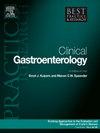How to measure quality in capsule endoscopy
IF 4
3区 医学
Q2 GASTROENTEROLOGY & HEPATOLOGY
Best Practice & Research Clinical Gastroenterology
Pub Date : 2025-06-01
DOI:10.1016/j.bpg.2025.102012
引用次数: 0
Abstract
Small bowel capsule endoscopy (SBCE) is widely regarded as the gold standard for the diagnosis of small bowel disorders, offering a minimally invasive and highly accurate diagnostic method. To improve diagnostic precision, international societies have established guidelines and quality initiatives; however, real-world implementation remains inconsistent, with numerous centers failing to meet the recommended benchmarks. Key challenges include variability in bowel preparation, the management of identified pathology, and adherence to recommended timelines, particularly following overt bleeding. Achieving high-quality SBCE is essential for improving clinical outcomes and ensuring the reliability of procedural benchmarks. Future research should focus on exploring the potential role of artificial intelligence in improving the quality of capsule endoscopy, evaluating the training requirements for clinicians and trainees, optimizing strategies to increase completion rates, and standardizing bowel preparation protocols across clinical settings.
胶囊内窥镜检查质量如何衡量
小肠胶囊内镜(Small bowel capsule endoscopy, SBCE)是一种微创、高精度的诊断方法,被广泛认为是小肠疾病诊断的金标准。为了提高诊断的准确性,国际社会制定了指导方针和质量倡议;然而,现实世界的实施仍然不一致,许多中心未能达到推荐的基准。主要的挑战包括肠准备的可变性,病理鉴定的管理,以及对推荐时间表的遵守,特别是在明显出血后。实现高质量的SBCE对于改善临床结果和确保程序基准的可靠性至关重要。未来的研究应侧重于探索人工智能在提高胶囊内窥镜检查质量、评估临床医生和受训者的培训要求、优化提高完成率的策略以及在临床环境中标准化肠道准备方案方面的潜在作用。
本文章由计算机程序翻译,如有差异,请以英文原文为准。
求助全文
约1分钟内获得全文
求助全文
来源期刊
CiteScore
5.50
自引率
0.00%
发文量
23
审稿时长
69 days
期刊介绍:
Each topic-based issue of Best Practice & Research Clinical Gastroenterology will provide a comprehensive review of current clinical practice and thinking within the specialty of gastroenterology.

 求助内容:
求助内容: 应助结果提醒方式:
应助结果提醒方式:


